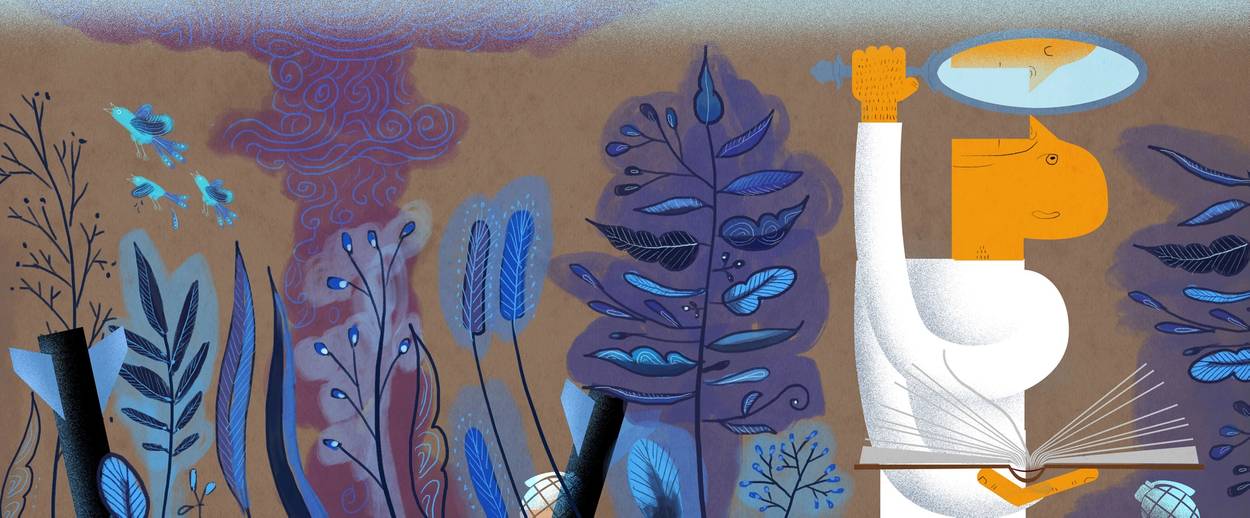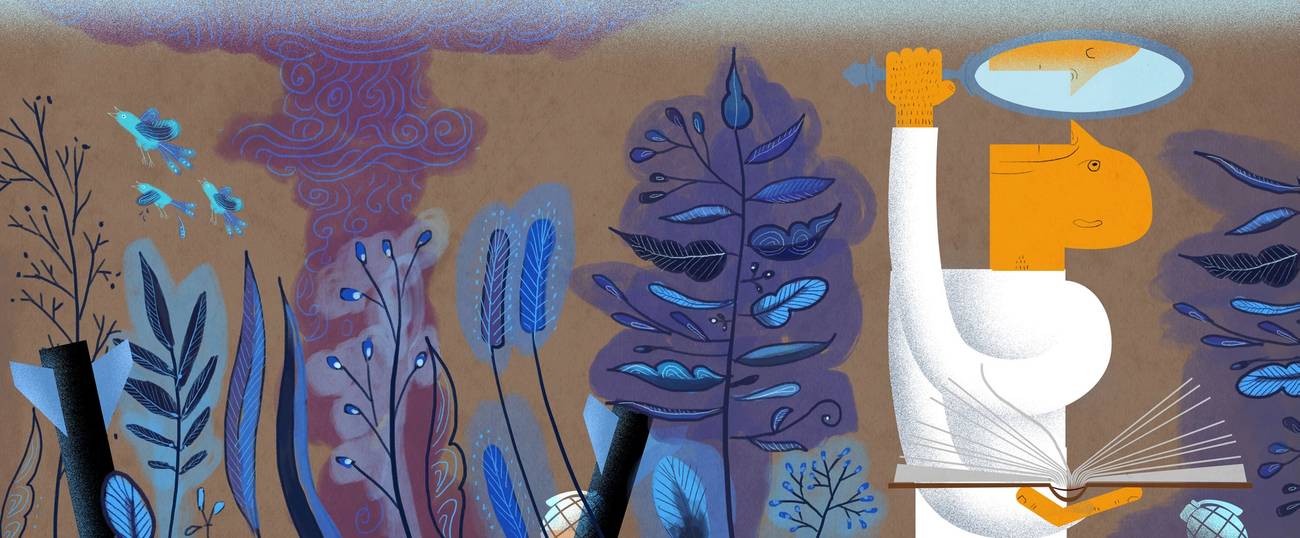Only Adolescents Question God’s Existence
The yes or the no of it: What does it matter?




Only adolescents worry about the existence of God: the yes or no of it. Most of us have decided one way or the other long before we owned our first car. The subject grows boring, the arguments worn thin either way. There is real life to be attended to, and the God question grows stale. We do what is expected of us. We get married by the clergy who invoke His presence and bury our loved ones with prayers and pleas to an all-powerful being, even if we are skeptics or agnostics or atheists or scoffers who playact our way through one ceremony after another. We no longer stay up until dawn considering the matter. And yet the question remains at the edges of our minds, in sleepless hours, in moments of crisis.
We Jews are not particularly concerned about Hell. Perhaps that’s because life on earth can be searing enough, sufficiently punishing to make the vision of Hell seem childish and Dante a moralist who forgives too little. Jews picked up visions of resurrection and the tortures of Gehenna from the neighborhood around us. The folk most of us came from did believe in Lilith’s power, the evil eye, the force of prayer to heal or avert disaster. All that depends on a belief in a loving or vengeful God. Hurry up, the gates of heaven are closing for another year.
But the existence of God is another more difficult issue. No matter how much science we study, no matter how far into space mankind travels, no matter how many secrets of the universe are revealed to the Einsteins of every generation, there are still ultimate questions. We may know about explosions in space but we don’t know whether the chain of events leading to human existence was a fortuitous accident, or maybe a not so fortuitous accident, or was it a design intended by a deity, or many deities. We may have our doubts but we don’t have certainties.
Yes, some people have certainties. They manage to ignore the contradictions, to shrug their shoulders at uncomfortable questions, like how could God have created Auschwitz. Why do volcanoes erupt and pour lava on innocent villagers and why do rivers flood and why do babies die of cancer and what trickster is this God who makes humans suffer again and again regardless of their virtue. We see nature not simply red in claw but without mercy or memory and we see man, who is nature’s crown jewel (according to us), behave with no more tenderness than a boa constrictor or the AIDS virus.
On the other hand there are the lilies of the field, and they are truly wondrous. There is the coming and going of the ocean tides and the colors of dawn and the birdsong at dusk and a million other specifics of life on earth that bring awe to the human heart and make us think not about seven days but about the millions of years, the fantastic crawl of the first fish that attempted to walk the land, the smells of harvest and the newborn emerging wet and raw and alive. Maybe no God was present at the beginning and maybe no God is with us now but there is no denying that we live, have lived, and will live for at least a while into the future. That is quite a tremendous fact, which deserves our attention from time to time.
If there is no God at all then there is no moral force above us or below us and good and bad are choices with enormous consequences but nothing is written in stone, including the Ten Commandments. If there is no God, I am wasting my breath being angry with Him, as I frequently am. There is no excuse for a powerful God to have allowed the world to break into a thousand pieces that cannot be put back together again. I don’t forgive this God I don’t believe in.
I know of course many people manage to avoid the issue and claim to accept the givens of religion and culture, after all who are we to rebel against the ways of those who begot us? But a price is paid for believing what you are supposed to believe and not rocking any boat. It is the price of ridicule. The very stars must look down on the ills of humanity while icicles of irony slide down the milky way. Human hope freezes even as it pretends to be protected by God’s love.
In Genesis we have a great story and when we come to the sacrifice of Isaac by his father Abraham we have a tale of upside-down Oedipal force and a rendering of the human heart, always ambivalent, hostile to its own, loving too, ready to serve a higher power, one that has created this cruel experiment to test the loyalty of his chosen man. Who would wish to be chosen by a God who would play such a game with His creature? The story reflects badly on God only if He exists. If man invented the story than it reflects only on the human confusions of love and anger.
Without God human actions are brutal. With God they are also brutal. Proving nothing about the existence of God but telling us that human beings are incorrigible and while they are ready to die for their country and their God they are also willing to kill for the same reasons.
While the Jewish God cannot be reduced to fragments of stone rubble He can still be seen as the Wizard of Oz hiding behind his curtain and creating sound and light effects but incapable of sending Dorothy home.
There is nothing that I am saying that is not in the minds of most of us. Some may ignore it. Some may challenge it. But everyone knows that it might be true that we live on this planet alone with our small hearts and petty dreams and that our chances of experiencing great pain before we die are very great.
I would like to be wrong. I am not a philosopher or a scientist, not Augustine or Sartre, not Wittgenstein or Plato, or Kierkegaard, just a writer living in 2015 and thinking that God cannot be Shiite or Sunni. He cannot be Catholic or Protestant. It makes no sense that he is Jewish and all the other peoples of the world are sending their prayers in the wrong direction. He might be there for everyone and just wear a different outer garment in different geographies. But if that were so would it make sense for Him to allow his multiple different followers to chop each other to bits, literally? If He doesn’t have the power to create human unity then what use is He to us? And if He is no use to us why don’t we look at ourselves in the mirror instead of answering the call to prayer?
I know these thoughts are sophomoric. But each of us thinks about this problem and each of us forges a belief system that is the truest we can find, and this is not a matter for the ordained or the intellectual alone. It is for the mother of the sick child, the father of the lost soldier, the soldier himself, the rocket scientist and the kindergarten teacher. It is a very democratic issue.
I was told the story that André Gide and Paul Claudel argued endlessly about the existence of God. Gide was a nonbeliever and Claudel a devout Catholic. The day after Claudel died a telegram was delivered to Gide. It read, “Dieu existe, Paul Claudel.” And so it was settled.
But when I read Gerard Manley Hopkins I think I do believe. I do believe at least in what we can say about God, in what the poet has said about God:
I caught this morning morning’s minion, king-
dom of daylight’s dauphin, dapple-dawn-drawn Falcon, in his riding
Of the rolling level underneath him steady air, and striding
High there, how he rung upon the rein of a wimpling wing
In his ecstasy! then off, off forth on swing,
As a skate’s heel sweeps smooth on a bow-bend: the hurl and gliding
Rebuffed the big wind. My heart in hiding
Stirred for a bird,—the achieve of, the mastery of the thing!
Anne Roiphe is a novelist and a journalist.